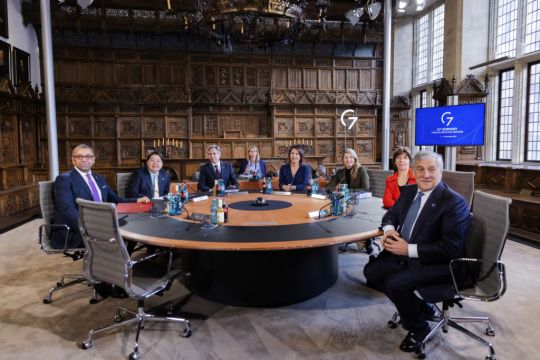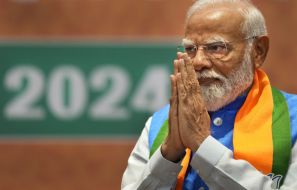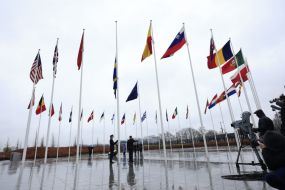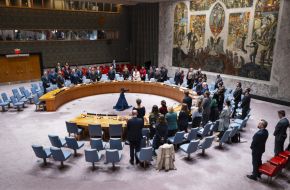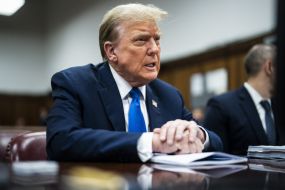Top diplomats from the world’s major industrialised democracies have rallied support for Ukraine in its resistance to Russia’s invasion and expressed suspicion of China’s increasing assertiveness amid a panoply of global crises.
Foreign ministers from the Group of Seven nations, wrapping up two days of talks in the historic western German city of Muenster, released a joint statement asserting common positions on Ukraine, Russia, China and recent developments in Iran and North Korea.
A year after warning Russia about the consequences of invading Ukraine, the G7 ministers endorsed further punishments for the Kremlin, including setting a price cap for Russian oil exports in the coming weeks.
They also pledged additional backing for Kyiv by creating a new mechanism to assist with its reconstruction and other countries affected by food and energy shortages the war has exacerbated.

“We reiterate our unwavering commitment to continue providing the financial, humanitarian, defence, political, technical, and legal support Ukraine needs to alleviate the suffering of its people and to uphold its sovereignty and territorial integrity,” the statement said.
The ministers accused Russia of “trying to terrorise the civilian population” of Ukraine by targeting critical power, water and other infrastructure and demanded an end to the war.
“We will continue to impose economic costs on Russia and on other countries, individuals or entities providing military support for Moscow’s war of aggression,” it said.
Along with the UK, Canada, France, Germany, Italy, Japan and the United States comprise the G7.
The ministers also called out Iran for allegedly supplying weapons including drones to Russia and a violent crackdown on anti-government protesters.
They condemned Iran’s “brutal and disproportionate use of force against peaceful protesters and children” as well as Tehran’s “continued destabilising activities in and around the Middle East”.
In addition, the statement further condemned the recent escalation of tensions in Asia caused by North Korean missile launches and delivered a stern warning against a possible new nuclear test.
“Any nuclear test or other reckless action must be met with a swift, united, and robust international response,” they said.

One senior US official said the group of advanced economies had demonstrated “remarkable” unity on virtually all major issues despite often-competing domestic interests and priorities, particularly in regards to China’s growing economic clout and global ambitions even as the leader of G7 host Germany, Chancellor Olaf Scholz, visits Beijing.
The ministers said they sought “constructive co-operation with China, where possible and in our interest” in areas such as climate change, clean energy and health but cautioned that Beijing must abide by global regulations, especially as they relate to Taiwan.
“These challenges can only be tackled successfully through co-operation within the rules-based international order,” they said.
“We remind China of the need to uphold the principles of the UN Charter on peaceful settlement of disputes and to abstain from threats, coercion, intimidation, or the use of force. We strongly oppose any unilateral attempts to change the status quo by force or coercion.”
Mr Scholz was in Beijing on Friday, the first European and G7 leader to make the trip since the war in Ukraine began.
Chinese investment in a major port project in Germany has raised concerns in Washington and other capitals that China might gain a controlling interest in critical infrastructure in the heart of an allied country.

The visit has drawn criticism due to China’s tacit support for Russia, and for coming after Chinese leader Xi Jinping cemented his authoritarian rule at a Communist Party congress last month.
But it reflects the importance of Germany’s trade ties with China, the world’s second-largest economy.
Despite the strong words, it remains unclear how much influence the G7 actually wields.
Its warnings to Russian President Vladimir Putin last December to stay out of Ukraine went unheeded and Mr Xi is forging ahead with plans to reunify Taiwan with the mainland by force, if necessary.
In the meantime, Iran has ignored calls to return to a 2015 nuclear deal with world powers, started to supply weapons to assist Russia in the Ukraine war, and launched a major crackdown on domestic dissent.
Similarly, North Korea has shunned appeals to return to nuclear negotiations and stepped up missile launches, raising tensions and fears of an open conflict.
In Germany, many have noted the historic significance of the venue where the G7 ministers were meeting: the room where the Treaty of Westphalia ending Europe’s bloody 30 Years War was signed in 1648.
US secretary of state Antony Blinken referred to the 374-year-old document, saying Russia’s invasion of Ukraine was an attack on the concepts of national sovereignty and territorial integrity that many believe the centuries-old treaty established.
